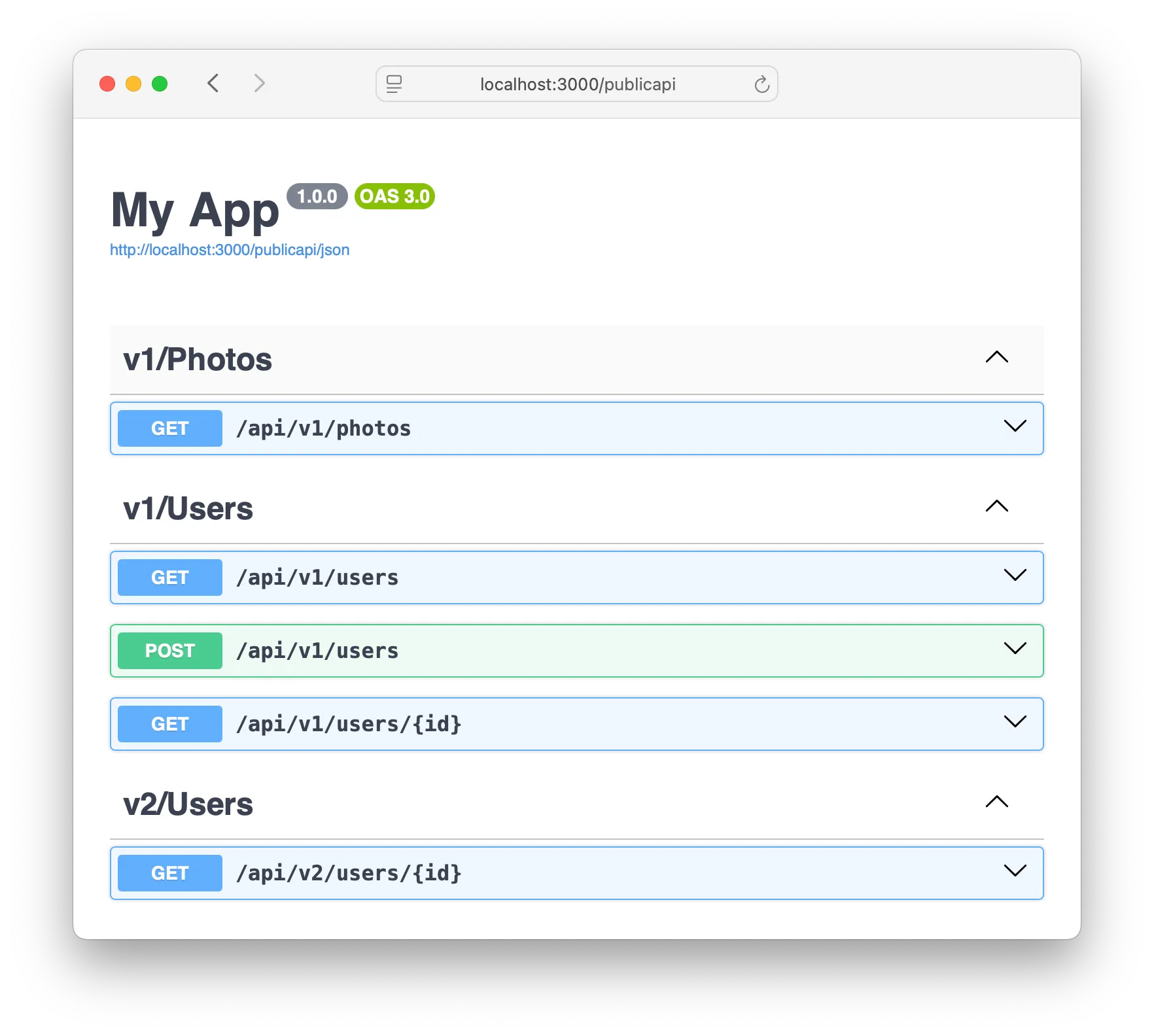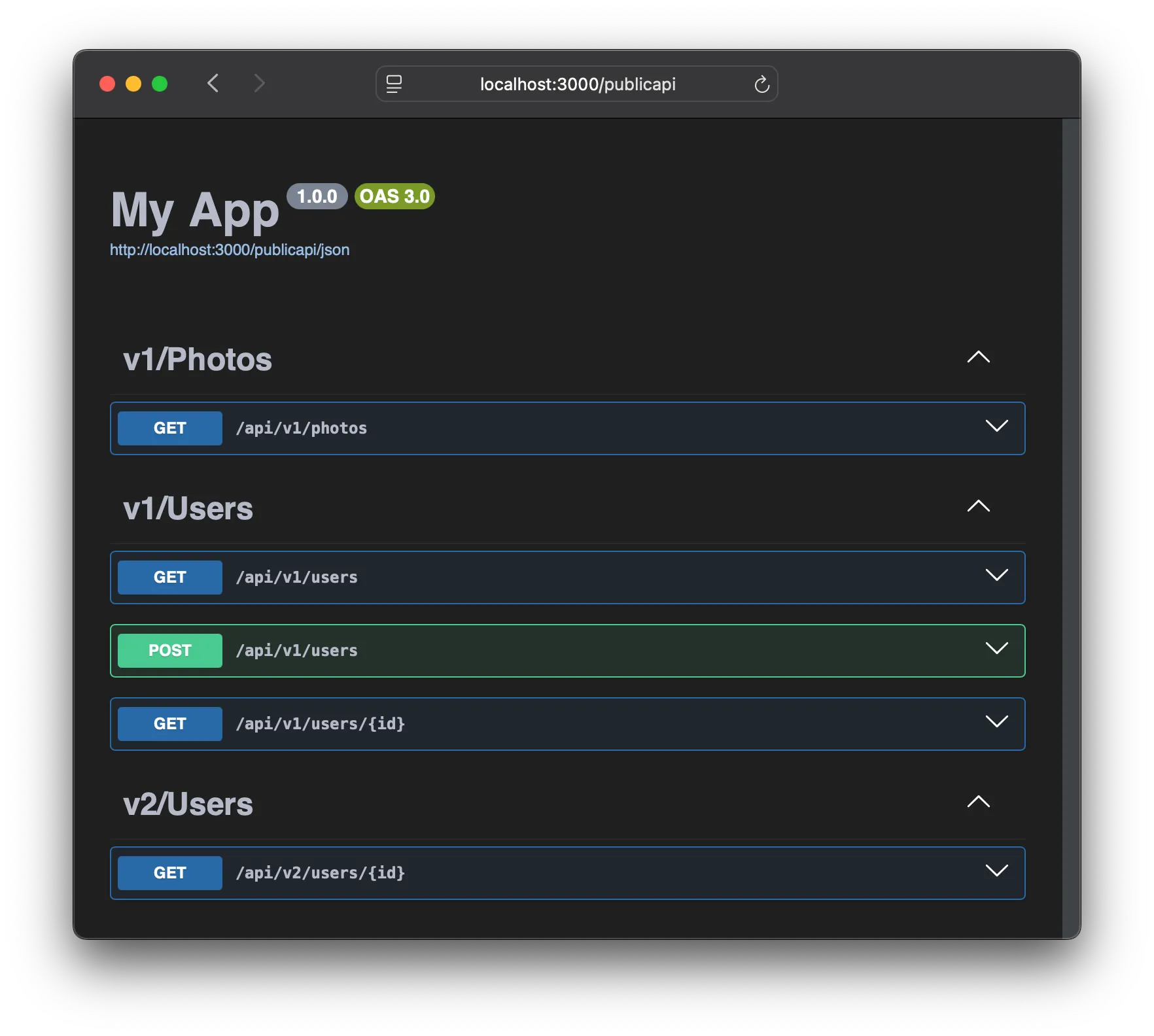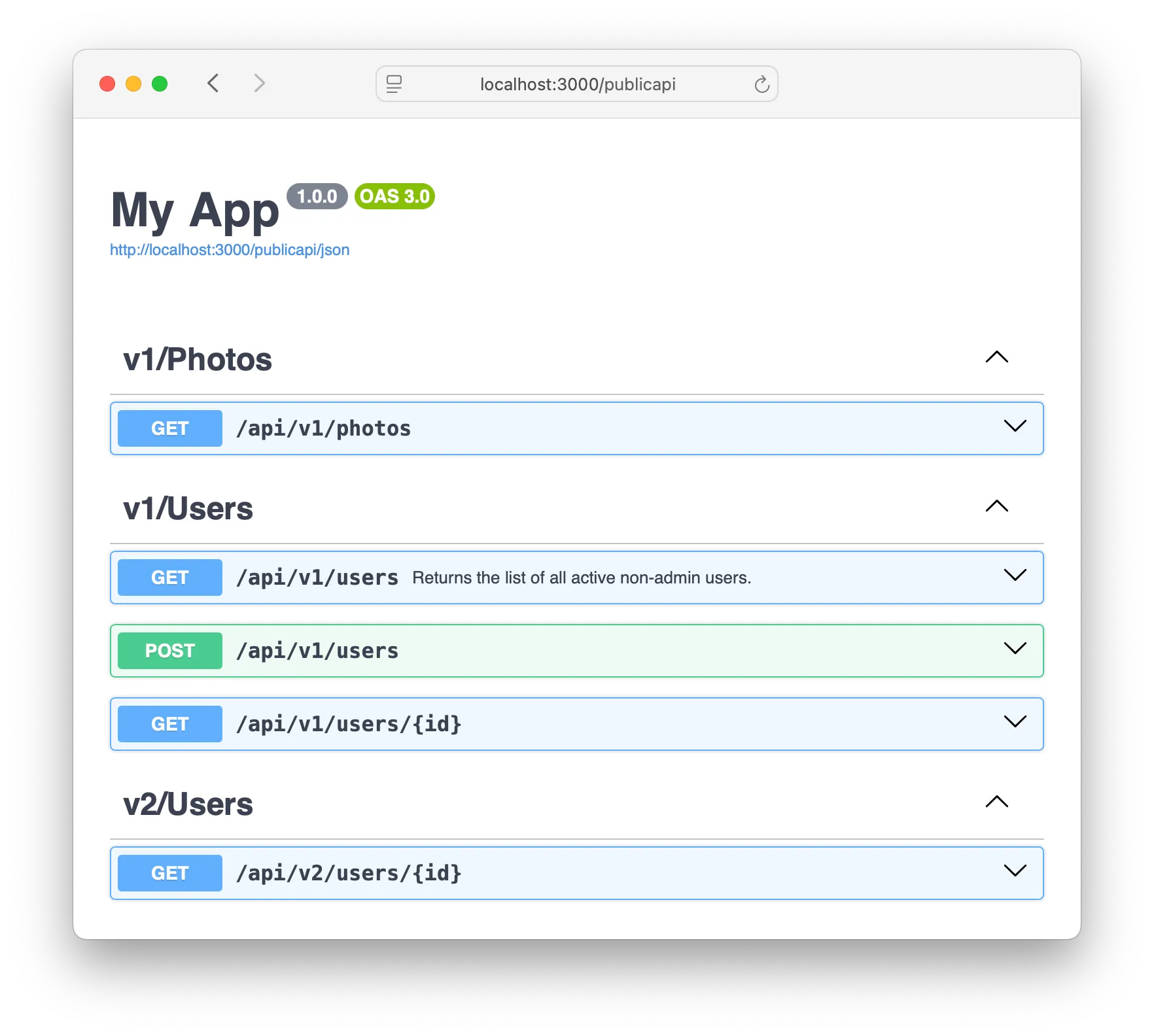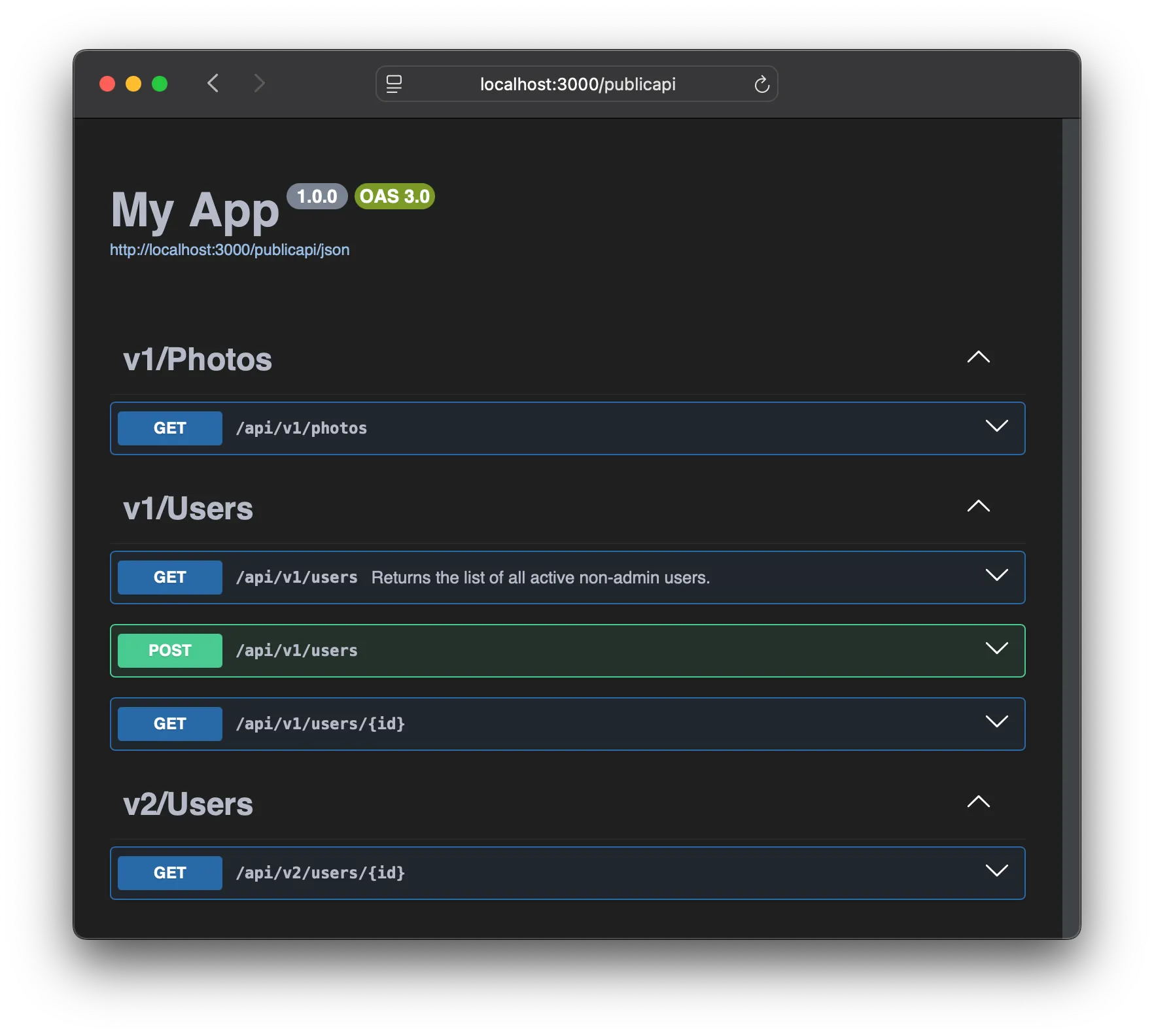OpenAPI Documentation
Rage includes built-in support for generating OpenAPI specifications automatically from your controllers. Rage::OpenAPI analyzes your routes and controller code to create interactive API documentation.
Try It First
Before setting up your own project, try the OpenAPI Playground to see how Rage::OpenAPI works. Experiment with different tags and serializers to understand the features available.
Setup
Mount Rage::OpenAPI in your application to expose an OpenAPI specification endpoint.
Option 1: Mount in config.ru
map "/publicapi" do
run Rage::OpenAPI.application
end
Option 2: Mount in Routes
Rage.routes.draw do
mount Rage::OpenAPI.application, at: "/publicapi"
end
Basic Usage
Let's say you have these routes defined:
Rage.routes.draw do
namespace :api do
namespace :v1 do
resources :users, only: %i[index show create]
resources :photos, only: :index
end
namespace :v2 do
resources :users, only: :show
end
end
end
Start your server with rage s and visit http://localhost:3000/publicapi. You'll see an automatically generated specification listing all your endpoints:


Documenting Your API
While the auto-generated specification is a good start, you'll want to add descriptions, parameters, and response schemas to make it truly useful.
The Rage Approach
Rage::OpenAPI uses a simple, focused approach:
- No complex DSL - Instead of learning a complicated domain-specific language, you use familiar YARD-style tags
- Documentation in code - Tags go directly in your controllers, keeping docs close to implementation
- Focused scope - Covers the most common documentation needs without trying to expose every OpenAPI feature
This approach means you spend less time learning tools and more time building your API.
How Tags Work
You document your API using comment tags above controller actions:
- Action-level tags (like
@description) apply to a specific action - Class-level tags (like
@deprecated) apply to all actions in that controller and any child controllers
Available Tags
Summary
Add a simple comment above your action to create a one-line summary:
class Api::V1::UsersController < ApplicationController
# Returns the list of all active non-admin users.
def index
end
end
The summary appears in your OpenAPI specification:


Description
Use @description for longer, more detailed explanations. It supports Markdown formatting and can span multiple lines:
class Api::V1::UsersController < ApplicationController
# Returns the list of all active non-admin users.
# @description This endpoint provides access to all registered
# users in the system. Only **non-admin users** are included
# in the response.
def show
end
end
Version and Title
Use @version and @title to set metadata for your entire API specification. These tags should appear only once and set the title and version properties of the info object:
class ApplicationController < RageController::API
# @version 1.0.0
# @title User Management API
end
Internal Notes
Leave notes for other developers that won't appear in the public specification:
class Api::V1::UsersController < ApplicationController
# @internal All changes to this action must be approved by a principal engineer.
def create
end
end
Deprecation
Mark individual actions as deprecated:
class Api::V1::UsersController < ApplicationController
def index
end
# @deprecated
def create
end
end
Or mark an entire controller as deprecated (affects all actions and child controllers):
class Api::V1::UsersController < ApplicationController
# @deprecated
def index
end
def create
end
end
Authentication
Document your authentication requirements using the @auth tag. It automatically tracks which endpoints require authentication based on your before_action callbacks:
class ApplicationController < RageController::API
before_action :authenticate_by_token
# @auth authenticate_by_token
private
def authenticate_by_token
# Authentication logic
end
end
Rage::OpenAPI automatically:
- Tracks all uses of the
authenticate_by_tokencallback - Respects
skip_before_actioncalls - Applies the security scheme only to protected endpoints
By default, it uses bearer token authentication:
type: http
scheme: bearer
Custom Security Schemes
Customize the security scheme by adding YAML inline:
class ApplicationController < RageController::API
before_action :authenticate_by_token
# @auth authenticate_by_token
# type: apiKey
# in: header
# name: X-API-Key
end
Multiple Security Schemes
Support multiple authentication methods:
class ApplicationController < RageController::API
before_action :authenticate_by_user_token
before_action :authenticate_by_service_token
# @auth authenticate_by_user_token
# @auth authenticate_by_service_token
end
Custom Scheme Names
Rename the security scheme in the specification:
class ApplicationController < RageController::API
before_action :authenticate_by_token
# @auth authenticate_by_token UserAuth
end
Responses
Rage::OpenAPI provides three ways to document response schemas:
1. Inline Schema
For simple responses, define the schema directly in the tag:
class Api::V1::UsersController < ApplicationController
# @response { id: Integer, full_name: String, email: String }
def show
end
end
2. Shared References
For complex or reusable schemas, use shared references.
3. Automatic Schema Generation
Rage::OpenAPI can automatically generate schemas from ActiveRecord models or Alba serializers.
Given this Alba resource:
class UserResource
include Alba::Resource
root_key :user
attributes :id, :name, :email
end
Reference it in your controller:
class Api::V1::UsersController < ApplicationController
# @response UserResource
def show
end
end
This generates:
schema:
type: object
properties:
user:
type: object
properties:
id:
type: string
name:
type: string
email:
type: string
Most Alba features are supported, including associations, key transformations, inheritance, and typed attributes.
Collections
Use Array<> or [] syntax for arrays:
class Api::V1::UsersController < ApplicationController
# @response Array<UserResource>
def index
end
end
Namespace Resolution
Rage::OpenAPI takes namespaces into account. If you have Api::V1::UserResource and Api::V2::UserResource, referencing UserResource from Api::V2::UsersController automatically uses Api::V2::UserResource.
Multiple Status Codes
Document different responses for different status codes:
class Api::V1::UsersController < ApplicationController
# @response 200 UserResource
# @response 404 { error: String }
def show
end
end
Global Responses
Apply responses to all actions in a controller and its children:
class Api::V1::BaseController < ApplicationController
# @response 404 { status: "NOT_FOUND" }
# @response 500 { status: "ERROR", message: String }
end
Request Bodies
The @request tag works similarly to @response. It accepts inline schemas, shared references, or ActiveRecord models.
When using ActiveRecord models, Rage::OpenAPI automatically excludes internal attributes like id, created_at, updated_at, and type:
class Api::V1::UsersController < ApplicationController
# @request User
def create
end
end
You can also use inline schemas:
class Api::V1::UsersController < ApplicationController
# @request { name: String, email: String, password: String }
def create
end
end
Query Parameters
Document query parameters using the @param tag:
class Api::V1::UsersController < ApplicationController
# @param account_id The account the records are attached to
def index
end
end
Optional Parameters
Add ? after the parameter name to mark it as optional:
class Api::V1::UsersController < ApplicationController
# @param created_at? Filter records by creation date
def index
end
end
Parameter Types
Specify types using {} syntax:
class Api::V1::UsersController < ApplicationController
# @param is_active {Boolean} Filter records by active status
# @param page {Integer} Page number for pagination
# @param per_page? {Integer} Items per page
def index
end
end
Shared References
For complex or reusable schemas, create a file with shared OpenAPI component definitions. This file can be in YAML or JSON format and must have a root components key.
Create config/openapi_components.yml:
components:
schemas:
User:
type: object
properties:
id:
type: integer
name:
type: string
email:
type: string
format: email
Error:
type: object
properties:
message:
type: string
code:
type: string
Reference these components in your controllers using JSON Pointer syntax:
class Api::V1::UsersController < ApplicationController
# @response 200 #/components/schemas/User
# @response 404 #/components/schemas/Error
def show
end
end
Controlling Visibility
Sometimes you want to hide certain endpoints from your public API documentation. Rage::OpenAPI provides two ways to control visibility.
Using @private
Hide individual actions:
class Api::V1::UsersController < ApplicationController
def show
end
# @private
def create
end
end
Or hide entire controllers:
class Api::V1::UsersController < ApplicationController
# @private
def show
end
def create
end
end
Namespace Filtering
Limit the specification to a specific namespace:
map "/publicapi" do
run Rage::OpenAPI.application(namespace: "Api::V2")
end
This only includes controllers under Api::V2::.
Multiple Specifications
Create different specifications for different audiences:
map "/publicapi" do
run Rage::OpenAPI.application(namespace: "Api::Public")
end
map "/internalapi" do
use Rack::Auth::Basic do |user, password|
user == "admin" && password == ENV["ADMIN_PASSWORD"]
end
run Rage::OpenAPI.application(namespace: "Api::Internal")
end
Custom Tag Organization
By default, Rage::OpenAPI groups endpoints by their controller namespace. For example, Api::V1::UsersController actions are grouped under the v1/Users tag.
You can customize this grouping with a tag resolver:
Rage.configure do
config.openapi.tag_resolver = proc do |controller, action, default_tag|
# Custom logic here
end
end
The resolver receives three arguments:
controller- The controller classaction- The action name (symbol)default_tag- The original tag generated byRage::OpenAPI
The resolver should return a string or array of strings representing the tag(s) for the endpoint.
Example: Multiple Tags
Rage.configure do
config.openapi.tag_resolver = proc do |controller, action, default_tag|
tags = [default_tag]
if controller.name.include?("Admin")
tags << "Admin"
elsif controller.name.include?("Public")
tags << "Public API"
end
tags
end
end